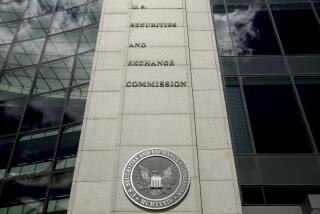Magna Promoter Sought : Indictment: Jacob Rubenstein is one of four men charged with manipulating stock of defunct Thousand Oaks company.
- Share via
The key figure in a criminal indictment unsealed by a federal grand jury in Los Angeles remained at large Monday. Jacob Rubenstein, a shareholder and principal promoter of Magna Technologies, a defunct Thousand Oaks company, is one of four men charged in the indictment with manipulating Magna stock.
“I don’t expect his imminent arrest,” said John Walsh, assistant U.S. attorney.
Last week, Walsh said the government investigated a lead that Rubenstein was in Las Vegas, but it didn’t “pan out.”
Robert Victor, another Magna shareholder named in the indictment, turned himself in to authorities Friday, Walsh said.
A convicted felon who changed his name from Robert Viggiano, Victor was referred to in police reports from the investigation of ZZZZ Best, the Reseda carpet cleaning company that folded in 1987 after widespread fraud, as “a reputed member of the Colombo organized crime family.” During the securities fraud trial of Barry Minkow, who founded ZZZZ Best at age 16, Minkow’s attorneys said Victor, a ZZZZ Best shareholder, used threats and violence to force Minkow into the fraud.
Victor was never charged with a crime relating to ZZZZ Best. Minkow was convicted in 1988 of 57 counts of fraud.
Another defendant in the Magna indictment is Magna’s former chairman, Robert Gutstein, an Agoura Hills plastic surgeon. Gutstein is expected to surrender to authorities this week, Walsh said.
The fourth defendant in the Magna indictment, Herbert Stone, is serving a two-year sentence in federal prison for stock manipulation unrelated to Magna. Stone was a New York securities broker and a market maker for Magna stock.
The indictment, which was returned March 7 and unsealed last Wednesday, charges the four men with 42 counts of conspiracy, securities, wire, bank and tax fraud. Each count carries a maximum penalty of five years in prison.
Rubenstein, Gutstein, Stone and four others also were named in a civil suit filed in May, 1987, by the Securities and Exchange Commission, which accused them of manipulating Magna stock. The defendants entered summary judgments in which they agreed to stop the activities cited in the suit without admitting or denying guilt.
The indictment states that in February, 1985, Rubenstein and Gutstein merged Magna with Bashney Biscuit, a bankrupt, publicly traded Florida corporation, thereby creating freely traded Magna stock without registering the stock with the SEC.
During the following eight months, the defendants carried out schemes to artificially inflate Magna’s stock price, the indictment alleges. The company once boasted that it acquired the rights to such offbeat products as a flexible pouch for carrying liquids, a battery-operated “stun gun,” a device to aid sexually impotent men and a hand-held, battery-operated “pain reliever.”
But Walsh said Magna produced no products during the period identified in the indictment.
The indictment alleges that Rubenstein, Gutstein and Victor enlisted the aid of friends and relatives who set up accounts at brokerage firms to trade in Magna stock, but that these accounts were actually controlled by the defendants.
Using these accounts, the defendants employed various tactics to drive the stock price up, including “wash sales,” in which a person buys and sells the same block of stock, “matched sales,” which involves two people trading the same block of stock, and “free-riding,” a technique of placing orders for stock without intending to pay for them, according to the indictment.
When actual shareholders placed orders to sell Magna stock, the defendants would fail to place the sell orders, the indictment alleges.
From March to September, 1985, Magna’s stock climbed from 50 cents a share to $9.50 before collapsing. The indictment alleges the defendants made more than $1 million through sales of Magna stock.
More to Read
Sign up for Essential California
The most important California stories and recommendations in your inbox every morning.
You may occasionally receive promotional content from the Los Angeles Times.












